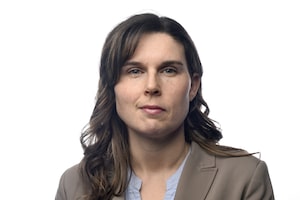Jo-Wilfried Tsonga of France celebrates winning the first set against Roger Federer of Switzerland during the Rogers Cup Men's tennis tournament final in Toronto on Sunday, August 10, 2014.Aaron Vincent Elkaim/The Canadian Press
For the first time in 11 years, someone outside the Big 4 in men's tennis has won the Rogers Cup. He even took down Roger Federer to do it.
World No. 15 Jo-Wilfried Tsonga rolled through four top-10 players on his way to a most unlikely title, polishing it off with a 7-5, 7-6 (3) victory in the final over the 17-time Grand Slam champion.
Tsonga was the substantial underdog, having won just four of his previous 15 meetings with Federer. The 29-year-old Frenchman was playing in his 20th tournament final on the ATP World Tour, compared with Federer's 120th. Tsonga was looking for his 11th career title, while Federer was after his 80th.
Since Andy Roddick won the Rogers Cup in 2003, no one outside the group of Federer, Novak Djokovic, Andy Murray and Rafael Nadal has won the lone Canadian stop of the year. In fact the Big 4 had won an astounding 36 of the past 39 Masters 1000 titles. Federer was the winner in Canada in 2006 and 2004. To boot, Sunday's crowd was unmistakably pro-Federer, spotted with fans in RF hats and wearing T-shirts reading "Betterer."
"When you play Roger, of course you are always the challenger for the people in the crowd," Tsonga said.
Yet the Frenchman was enjoying a monster week in Toronto, the greatest roll of his career. He knocked off top-ranked Djokovic, world No. 9 Murray and No. 8 Grigor Dimitrov on the way to the final.
The sun blazed on Sunday at Rexall Centre as temperatures soared over 31 C. Tsonga had contended in hot afternoon conditions all week, while Federer had played late-evening matches. The tennis legend made 15 unforced errors in the first set – long shots, wide shots and blunders into the net. Tsonga applied pressure, took care of his serve and his confidence swelled. Federer didn't seem very Federer.
"The overall day conditions were tough for me, [the court] was faster in the day than in the night in all my previous matches," Federer said. "Today was just difficult in terms of rhythm from the baseline, so it was like a new tournament for me today."
Just as it appeared the Swiss star would push the first set into a tiebreak, the veteran fumbled a couple of easy shots, and Tsonga broke to steal the set.
Down 3-2 in the second set, Federer battled mightily to stay on serve, withstanding a breakpoint, then fighting back to hold, which served to give him new life. To survive, he tossed in some serve-and-volley tactics, which not only thwarted Tsonga, but also thrilled the crowd.
They played to a tiebreak, and the Frenchman prevailed as Federer still struggled to make his shots. Tsonga became the first to beat a quartet of top 10s in a Masters 1000 event since Guillermo Canas did it in Toronto in 2002. When it ended, Tsonga looked around blankly for a second as if waiting for someone to clarify he had really done it. The player nicknamed Ali for his likeness to the legendary boxer, covered his face in shock, leapt about in celebration, and then scampered up into the stands to find his supporters. Thierry Ascione offered the first bear hug, his coach fittingly dressed in a T-shirt that read, "This is how we roll."
"I think for me it's gonna be a new motivation because, this last year I always lost against those guys, and it was really frustrating for me," Tsonga said. "A win against them, it's good for me, it's good for my ambition."
Tsonga takes home $598,900 (U.S.) in prize money along with 1,000 points in the ATP standing, which skyrockets him back up to No. 10. He was fighting to regain form after knee and back injuries and had slipped out of the top 10 in March after being there consistently since 2011.
Federer, already the top earner in tour history with $83,102,704, picks up another $298,650 and 600 points.
The Swiss megastar, who hasn't said how much longer he will play, was asked several times this week if this was his last appearance in Toronto. In 2016, when the men return to the city, the 2016 Rio Summer Olympics could cause a conflict for some players coming to Canada, as it did for some after the 2012 Olympics.
"I will have to see how I feel then, you know, how I am playing, what is the best possible preparation for the Olympics," said Federer, who won an Olympic silver medal in 2012 and gold in doubles with Stan Wawrinka in 2008. "I guess that's going to take the importance of the summer. I really can't answer that question now."
Attendance was good for the Toronto tournament, with 148,341 spectators and four sellout days, including Sunday. It surpassed 2012 but was not as good at 2010.
 Rachel Brady
Rachel Brady